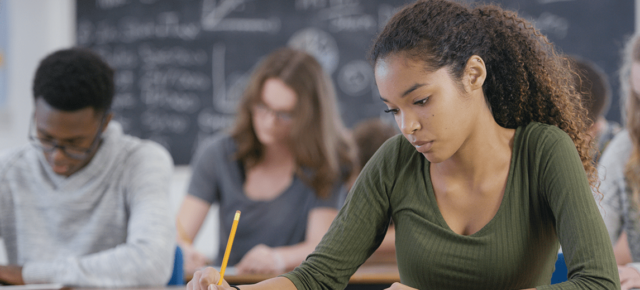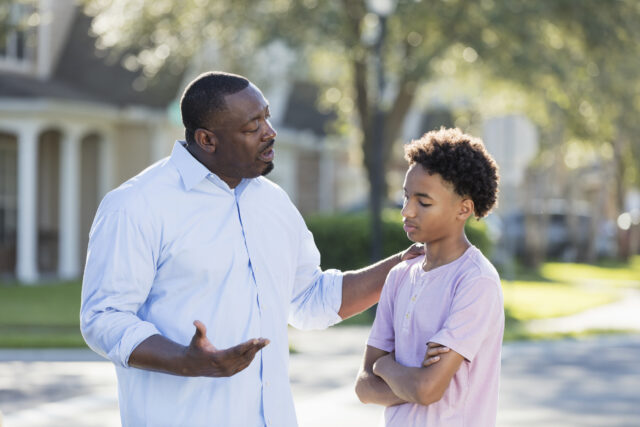Supporting Teenagers and Young Adults During the Coronavirus Crisis
Tips for parents with older children at home
Clinical Experts: Dave Anderson, PhD , Jill Emanuele, PhD , Joanna Stern, PsyD
en EspañolHaving teenagers confined to home during the coronavirus crisis may not be as labor-intensive as being holed up with small children, but it definitely has its challenges. While younger children may be thrilled at the prospect of having parental attention 24/7, adolescents are likely to feel differently.
Here are some tips for parenting teenagers (and young adults suddenly home from college) during this time.
The first challenge with teens and young adults may be getting them to comply with the guidelines for social distancing.
Teenagers tend to feel invincible, points out Dave Anderson, PhD, a clinical psychologist at the Child Mind Institute, and they may think that the new coronavirus is not as problematic for their age range as it is for older people. Parents are reporting a lot of pushback when teens are told they can’t go out and get together with friends. “They want to see their friends, and don’t see why the social distancing should apply to them,” says Dr. Anderson.
Parents are asking what to tell them. “Our answer is that exposure to this virus is an exponential thing, and that it’s not really about them,” says Dr. Anderson. “It’s not really about the fact that they feel fine. It’s the fact that they could be asymptomatic carriers and they could kill others, including their grandparents.” One thing to emphasize, he adds, is: “You just can’t know that your friends are well. And while you may be comfortable taking that risk, you’re also bringing that back in your house.”
It’s also important to help your teenagers understand that no one really knows yet how the coronavirus affects people of different age groups — contracting the virus might be very dangerous for your teenager, even though the facts are still unclear.
Understand their frustration over not seeing friends
For teenagers and young adults, friends are hugely important, and they are supposed to be — bonding with peers is one of the essential developmental tasks of adolescents. If your teen is sulking about being stuck at home with parents and siblings, a direct conversation might be helpful, says Rachel Busman, PsyD, a clinical psychologist.
Acknowledge that you know it’s frustrating for them to be cut off from friends. Listen to what they’re feeling, validate those feelings and then be direct about how you can work together to make this situation bearable. Loosening rules about time spent on social media, for instance, will help compensate for the socializing time lost with school closings. Encourage them to be creative about new ways to interact with their friends socially.
Support remote schooling
Parents are reporting feeling pressured and confused about how to help kids with remote learning. With younger children, notes Dr. Anderson, it’s more a matter of finding fun activities that can be educational. But with older students, keeping up with expectations from school can be challenging, especially for those with ADHD, learning disorders or organization issues.
“I’m completely overwhelmed by trying to figure out how to structure a school day,” one mom told us. “I was never planning on homeschooling my kids. I don’t have training in this.”
You can help teenagers — and college students who’ve been sent home — create a realistic schedule for getting work done in defined periods, building in breaks and times for socializing, exercising and entertainment. The key principle: do a session of work first, then reward yourself with something relaxing. Keep in mind that it’s not going to be as effective as school, but it may get to be more effective over time as everyone on the school front, as well as the home front, works to improve remote learning.
Encourage healthy habits
Teenagers and young adults will do better during this stressful time if they get adequate sleep, eat healthy meals and exercise regularly. Keeping a consistent sleep schedule, with predictable times to wake up and go to bed, is especially important to maintaining a positive mood and their ability to fulfill academic expectations.
Some ideas to keep moving include:
- Take family walks, hikes or bike rides.
- Encourage kids to take a class. Yoga, Pilates and Zumba are all offered online, in pre-recorded or group class formats, and at a variety of difficulty levels, from beginner to advanced.
- Offer to get them a personal trainer. This is a great option for teens who don’t have much experience working out or need the extra motivation. Trainers help clients reach personal goals they may have, which can make them a more compelling option for teenagers.
- Try running. Many people who don’t like exercise classes enjoy running, which can be calming and take them out into nature. For teens who need motivation, there are running groups online and programs like Couch to 5K to ease them in.
- Help kids keep playing sports. Make sure they have dedicated time in the backyard or at a local field to practice. Maybe your child can use this time away from competition to learn new skills, practice for a new position, or focus on endurance, strength training or flexibility. If your teen wants help, you could consider hiring a coach for some one-on-one training.
Healthy habits are particularly important for young people who may be struggling with anxiety or depression. Losing the routines you’ve come to rely on can be a big source of stress, so psychologist Jill Emanuele, PhD, recommends establishing new routines. “Make sure you’re eating properly and sleeping and being social and engaging in pleasant activities, ” she says, while also warning that young adults should avoid sleeping too much when they’re housebound. “There’s more of an ability to sleep at home, and while rest is important right now you still need to be active.”
Dr. Emanuele also notes that having family members around more often can feel overwhelming or create strain. “Families will need to diffuse tensions in the home with parents and siblings, because everyone is going to be stressed out more,” she says. “How to do it will be different for every family, but parents are going to want to think about when to give young people more freedom and how to make sure that their kids’ time is still structured. Everyone should be contributing in some way.”
Validate their disappointment
For many the most painful part of the coronavirus crisis will be losing important experiences: high school sports seasons, proms, theater productions, high school and college graduations. And while we’re all missing out on very valued activities, adds Dr. Anderson, “it’s especially problematic for teenagers who are wired in their brains to think about novelty and pleasure seeking and seeking out new frontiers to be limited in this way.”
Give them room to share their feelings and listen without judgment (or without reassuring them that everything will be fine).
Some will be worried about missing activities expected to help them with college applications and scholarships. Kids are understandably wondering how this will affect their futures. Again, give them room to share how they are feeling and acknowledge the real stress they may be under. Then express confidence in your child’s ability to rebound.
Help them practice mindfulness
Mindfulness techniques can be very helpful in this kind of situation, where our routines are disrupted and we may feel overwhelmed by frustration and disappointment. Mindfulness teaches us to tune into our emotions in any given moment and experience them without judgment.
In what’s called “radical acceptance,” we let ourselves sit with our emotions rather than fighting them. As psychologist Joanna Stern, PsyD, explains, “You tell yourself it’s okay to feel anxious right now. It’s okay to feel scared. It’s okay to feel angry. You’re accepting the feelings you have and validating them because we’re all having those feelings. It’s really important that you accept them as they are rather than fighting them.”
In other words, says Dr. Stern, “We say to ourselves: ‘This sucks, and I’m going to be sad about it, and I’m going to be angry about it, and I’m going to feel anxious about it,’ or whatever it is. This then allows us to move on and say, ‘Okay, so now what needs to be done?’”
Learn more about our Family Resource Center and our editorial mission.

Was this article helpful?
Related Reading
-
 Tips for Communicating With Your Teen
Keeping the parent-child relationship strong during a tricky age
Tips for Communicating With Your Teen
Keeping the parent-child relationship strong during a tricky age
-
 What to Do if You Think Your Teenager Is Depressed
Start by listening without judgment, not trying to 'fix' them
What to Do if You Think Your Teenager Is Depressed
Start by listening without judgment, not trying to 'fix' them
-
 How to Set Limits on Screen Time
Tips for prioritizing kids’ wellness and keeping fights to a minimum
How to Set Limits on Screen Time
Tips for prioritizing kids’ wellness and keeping fights to a minimum
-
 Complete Guide to Substance Use + Mental Health
When children are struggling with both a substance use disorder and a mental health disorder,…
Complete Guide to Substance Use + Mental Health
When children are struggling with both a substance use disorder and a mental health disorder,…
-
 Will My Child Bounce Back From the Coronavirus Crisis?
Trauma, resilience and how parents can help
Will My Child Bounce Back From the Coronavirus Crisis?
Trauma, resilience and how parents can help
-
 How Anxiety Affects Teenagers
Signs of anxiety in adolescents, and how they're different from anxious children
How Anxiety Affects Teenagers
Signs of anxiety in adolescents, and how they're different from anxious children
-
 What Is Binge Eating Disorder?
And how does it affect children and teenagers?
What Is Binge Eating Disorder?
And how does it affect children and teenagers?
-
 Does Social Media Use Cause Depression?
How heavy use of Instagram and other platforms may be affecting kids negatively
Does Social Media Use Cause Depression?
How heavy use of Instagram and other platforms may be affecting kids negatively
-
 ADHD in Teenagers
How to help kids handle the new challenges and expectations of high school
ADHD in Teenagers
How to help kids handle the new challenges and expectations of high school
-
 Meeting the Mental Health Needs of Black Adolescent Boys
Why young Black males are less likely to seek professional support and how parents, faith…
Meeting the Mental Health Needs of Black Adolescent Boys
Why young Black males are less likely to seek professional support and how parents, faith…
-
 Supporting Kids During the Coronavirus Crisis
Tips for nurturing and protecting children at home
Supporting Kids During the Coronavirus Crisis
Tips for nurturing and protecting children at home








